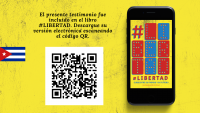Both my sister and I shared my husband’s and his brother’s struggle against the regime. Not only because we loved our husbands but also because we shared that desire for freedom.
Download image
Ileana Puig, maiden name Arango Cortina, was born into a politically active family on 12 November 1937, in Havana, Republic of Cuba. In 1956 she married Ramon Puig, involved in the struggle against the practices of the dictator Fulgencio Batista. When one of the consequences of the 1959 Cuban Revolution was the arbitrary executions and trials under the command of Fidel Castro, the entire family joined the opposition. Under different circumstances, Ileana’s brother, husband, and brother-in-law ended up in La Cabaña prison. Unfortunately, her brother-in-law, Manuel Puig, was sentenced and executed in April 1961, precisely when the American intervention in Giron Beach was culminating. Her sister emigrated with her four children to Miami, United States of America, where Ileana’s parents and young daughters joined them later. At the same time, she remained in Cuba because of her husband, a political prisoner. She never saw her parents again and was not reunited with her two daughters until 1973, after seven years. Fortunately, Ileana’s husband, Ramon Puig, was released after 15 years in prison and emigrated to Miami to reach his family. Today they reside in Miami. They do not regret any of their decisions and spread their family story full of pain and sadness, so that future generations will learn the value of freedom and be aware that everything has a consequence.
